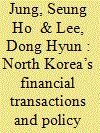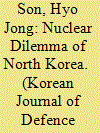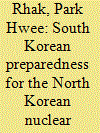|
|
|
Sort Order |
|
|
|
Items / Page
|
|
|
|
|
|
|
| Srl | Item |
| 1 |
ID:
153513


|
|
|
|
|
| Summary/Abstract |
Since the conclusion of the Comfort Women Agreement (December 2015) and the
General Security of Military Information Agreement (November 2016), it has been
widely believed that Japan–South Korea relations have hit bottom and begun to
rebound. How soon and how much they will recover depends on the Japanese and
South Koreans themselves. Can the people of Japan and South Korea escape the
fetters of the past? Can the two countries have as much security cooperation as the
United States desires? This paper argues that the recent development in Japan–ROK
relations provides little hope that the two countries will be freed from their historical
yoke as the two governments have wished. Sincere reconciliation on history
between America’s two essential Asian allies will be impossible for several decades
because domestic politics in both countries rewards nationalistic approaches to
Japan–ROK relations. In its policy toward East Asia, the Trump administration will
face the same dilemma as did its predecessors as long as Japan–South Korea history
disputes widen the mismatch in the two countries’ policy priorities toward China
and North Korea, a problem that is beyond U.S. control.
|
|
|
|
|
|
|
|
|
|
|
|
|
|
|
|
| 2 |
ID:
153511


|
|
|
|
|
| Summary/Abstract |
The traditional hostility between India and Pakistan has created a complex situation
in the region, and their traditional bilateral relations are ignoring and increasing
the nontraditional security (NTS) threats like terrorism, religious extremism,
drug trafficking, environmental issues, maritime piracy, natural disasters, energy
and economic crises which need a different diplomatic approach. Traditionally, a
country’s diplomatic principles and position were judged by its political wisdom
and military prestige. However, nontraditional diplomatic approaches have
opened a new debate in the diplomatic arena. This study coins a new notion of
diplomacy, “Nontraditional Security Diplomacy.” It argues that NTS diplomacy
is more productive to settle traditional and nontraditional security issues between
both conflicting states. It also strives to clarify the relationship between India and
Pakistan and their mutual NTS cooperation. This study has devised three key policy
options: cooperative security, security co-governance and peaceful coexistence
for security cooperation, while the means and methods represent the strategy of
understanding NTS challenges and cooperation between both states. Therefore, the
paper explores the relevant questions for their security cooperation. Resultantly,
it maps out the need for collaboration in NTS areas and maneuvers for practical
cooperation, which is favorable for the improvement of peaceful bilateral relations
between the two countries.
|
|
|
|
|
|
|
|
|
|
|
|
|
|
|
|
| 3 |
ID:
153510


|
|
|
|
|
| Summary/Abstract |
This study investigates North Korea’s method of circumventing financial sanctions
based on a survey of 100 Chinese firms engaged in trade with North Korea, as
well as in-depth interviews with high-ranking North Korean defectors who have
professional experiences in the financial sector. Survey results indicate that North
Korea still prefers dollar–based financial transactions in trade settlements of a
certain size. In addition, this study categorizes North Korea’s circumventing
financial transactions by five methods: transactions via bank accounts under
borrowed names, cash depositories, paper companies, joint-venture banks, and
embassies. Lastly, this research presents policy implications to enhance the
effectiveness of financial sanctions.
|
|
|
|
|
|
|
|
|
|
|
|
|
|
|
|
| 4 |
ID:
153507


|
|
|
|
|
| Summary/Abstract |
Why does North Korea continue to insist on maintaining a nuclear program despite
its potential to be detrimental to the regime in the long term? This article argues
that North Korea’s nuclear development strategy is derived from policymakers’
cognitive systems and norms that have accumulated over the decades. This study
especially attempts to examine the mechanism behind how the normative system
shaped by North Korea’s historical environment generates and re-generates nuclear
strategy through nuclear discourse by applying the lens of Strategic Culture. It
begins with a critical assessment of previous research on the motives of a nation
or regime’s nuclear development policy and proposes the suitability of Strategic
Culture for North Korea’s case. This article then characterizes North Korea’s
Strategic Culture as a “Wartime Preferring Strategic Culture” which emphasizes
the norm of the “prioritization of military values,” “closed groupism,” and “deontic
mass mobilization.” These norms are based on the policymakers’ cognitive systems
related to the fear of regime cleavage. Consequently, North Korea’s Strategic
Culture, which is based on fear perception, influenced policy makers and drove
them to strengthen nuclear development.
|
|
|
|
|
|
|
|
|
|
|
|
|
|
|
|
| 5 |
ID:
153508


|
|
|
|
|
| Summary/Abstract |
This study investigates the consequences of sudden regime changes in North Korea.
The study considers how large volumes of refugees would affect South Korea and
other neighboring countries. It also proposes likely countermeasures for South
Korea and its allies. If sudden regime change in North Korea were to lead to largescale
refugees entering China, Russia, Japan, and South Korea; it could bring
massive changes in the balance of power in Northeast Asia. A refugee crisis of this
magnitude demands meticulous planning to minimize unexpected consequences
to the region. This paper examines the following questions: What is the decisionmaking
process that refugees undergo when deciding to leave North Korea? What
would be the volume of North Korean refugees heading into China, Russia, and
Japan? What would be the volume of refugees entering South Korea? What would
be the most likely routes taken by refugees? This study analyzes these questions and
suggests policy implications for the South Korean government.
|
|
|
|
|
|
|
|
|
|
|
|
|
|
|
|
| 6 |
ID:
153512


|
|
|
|
|
| Summary/Abstract |
This paper will assess Cambodia’s current and future strategic and security
situation, arguing that current and future Cambodian national security will be
determined by the three key strategic security issues of domestic, geographic,
human and economic security. These three key security factors have significantly
underpinned Cambodia’s strategic challenges. The first strategic challenge is related
to the current domestic political deadlock between the two major political parties,
the ruling Cambodian People’s Party (CPP), led by Prime Minister Hun and the
opposition Cambodia National Rescue Party (CNRP), led by Sam Rainsy. The
current political contestation has significant challenges for Cambodian national
development as well as foreign policy. The second major strategic challenge
for Cambodia relates to economic security, and the requirement to balance the
strategic competition between China and the United States to gain influence within
Cambodia. This external power competition has a significant impact on Cambodia’s
political and economic circumstances as Cambodia remains heavily dependent
on foreign aid for political and economic development as can be seen today. The
key challenge is that while China and the United States are the largest providers,
they are competing for their own interests and influence in Cambodia, and the
wider Southeast Asian region. The third challenge facing Cambodia is centered
around managing its relationship with China and ASEAN claimants in the context
of territorial disputes over the South China Sea. This environment presents one of
the most challenging difficulties for the kingdom’s contemporary foreign policy.
These challenges have greatly impacted and shaped Cambodia’s reform agenda,
defense posture, political system and international engagements. The paper will also
consider how Cambodia’s effort and commitment towards reform and its integration
with the international community will not be achieved without overcoming these
three challenges.
|
|
|
|
|
|
|
|
|
|
|
|
|
|
|
|
| 7 |
ID:
153514


|
|
|
|
|
| Summary/Abstract |
This paper argues that President Park Chung-hee’s rapprochement with the Palestine
Liberation Organization (PLO) prior to a 1979 Middle East diplomacy summit
provides a relevant case for the analysis of South Korean foreign policy within the
framework of its pursuit of autonomy amidst conflicts within the asymmetric ROK–
U.S. alliance. Park was scheduled to visit Saudi Arabia and Kuwait in December
of that year, but the meeting never took place due to the 10.26 incident. Enhancing
autonomy, as opposed to relying solely on the United States for extended deterrence,
was the motivation behind South Korea’s pro-PLO policy, and was considered a
massive bargaining chip for attaining a beneficial outcome at the scheduled summit.
Given this context and the nexus between energy and national security, South
Korea expected its détente with the PLO to help promote national security and a
self-reliant defense policy, while safeguarding a stable supply of oil in the wake of
the second oil crisis. A further incentive for recognizing the PLO was improving
deterrent capability against North Korea through diplomatic diversification beyond
the traditional Cold War bloc. Considering Park’s plan for strategic rapprochement
with the PLO and growing conflict with the Carter administration, it is reasonable
to assume that the purpose behind his planned visit to Saudi Arabia and Kuwait was
to achieve greater autonomy.
|
|
|
|
|
|
|
|
|
|
|
|
|
|
|
|
| 8 |
ID:
153509


|
|
|
|
|
| Summary/Abstract |
This paper reviews the current state of South Korean nuclear preparedness and
draws out some necessary tasks for the future. It reviews all available options that a
non-nuclear, threatened country should take in response to the level of the nuclear
threat. These are a diplomatic approach, a preventive strike, deterrence, defense,
civil defense, and negotiations. In conclusion, South Korea has depended too much
on diplomatic solutions in the initial periods of the North Korean nuclear weapons
development. It did not review defense measures in depth and did not consider
the preventive strike option during that period. South Korea procrastinated on its
Ballistic Missile Defense (BMD) construction and did not review the necessity of
nuclear civil defense until the present. South Korean nuclear preparedness appears
to have many shortcomings. South Korea should expedite and improve its BMD
shield as soon as possible. It may need to utilize the preemptive strike capabilities of
the United States to provide more money for its BMD. It needs to prepare nuclear
blast and/or fall-out shelters by efficiently renovating existing conventional shelters
and other underground facilities.
|
|
|
|
|
|
|
|
|
|
|
|
|
|
|
|
|
|
|
|
|